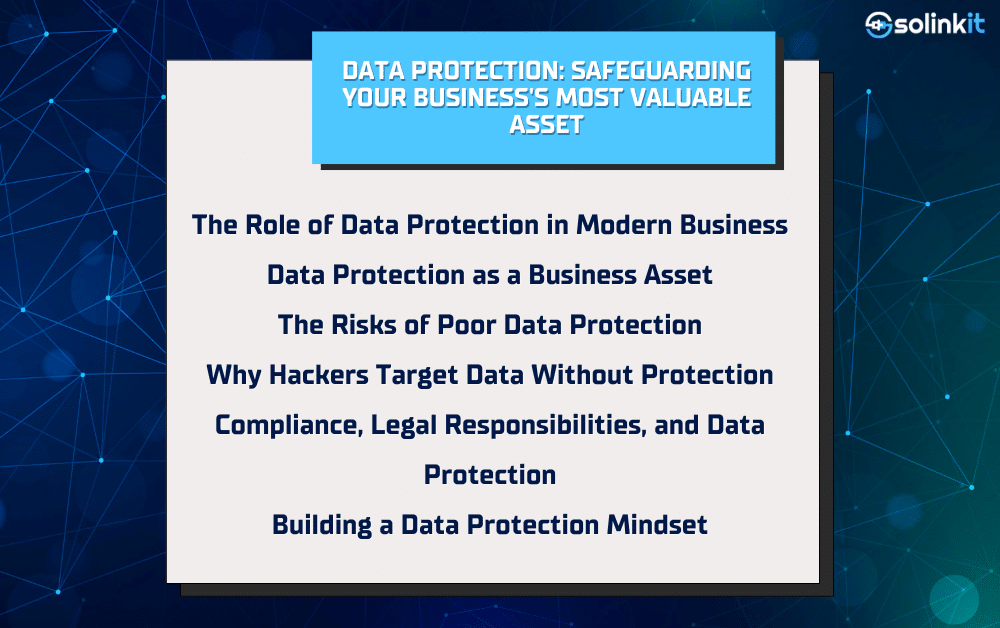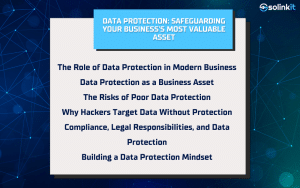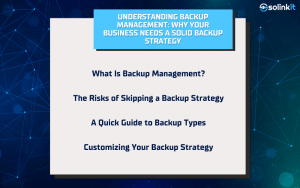Data is the information your business collects and uses every day—things like customer details, sales records, or employee files. This information helps you make smart choices and keep your business running smoothly. In this blog, we’ll explain why data protection is your most valuable priority and why it’s so important to keep information safe.
The Role of Data Protection in Modern Business
Data Protection Helps You Make Choices
Every business needs to make decisions. Data gives you the facts to decide what products to sell, when to order supplies, or how to serve customers better. Without proper protection, businesses risk losing this valuable information and making costly mistakes.
Protecting Customer Happiness
When businesses keep track of what customers like and buy, they can give them better service. Protecting this information with protection practices ensures customers feel safe and valued. A strong approach to data protection builds long-term trust and loyalty.
Keeping Daily Operations on Track
Data also helps with day-to-day work. Tracking inventory, employee schedules, or shipping details keeps everything running smoothly. If data is not protected and becomes missing or wrong, mistakes happen, and time and money are lost. Data protection reduces these risks.
Supporting Growth and Innovation
Data isn’t just about today—it helps plan for tomorrow. Looking at patterns in sales or customer behavior can help businesses come up with new ideas or products. With strong data protection, this information remains safe and reliable for growth.
Data Protection as a Business Asset
More Valuable Than Physical Assets
Your business may have buildings, tools, or machines, but data can often be even more valuable. Machines can wear out, but data grows in value as you collect and protect it. Data protection ensures that this asset continues to provide value.
Driving Business Growth
Data shows where your best customers are and what products they like most. This helps you grow faster and smarter. With protection in place, you can make sure this information stays safe and ready to use.
Big Companies Rely on Data Protection
Amazon and Netflix use data every day to make suggestions and give customers what they want. That’s a big reason why they’re so successful. Their success also comes from strong protection systems that keep customer information secure.
Why Small Businesses Need Protection
Even small stores or service companies can benefit from protection. For example, a local shop that tracks customer purchases can send special deals or reminders. Data protection keeps that customer information private and secure.
The Risks of Poor Data Protection
Financial Losses
If data is stolen or lost, it can cost your business a lot of money. You may need to pay to fix the problem, recover the data, or deal with lost sales. Without strong data protection, these risks increase dramatically.
Losing Customer Trust
When customer information is not safe, people stop trusting your business. Once trust is broken, it is very hard to earn back. Data protection is key to keeping customer confidence.
Mistakes in Everyday Work
Bad or missing data can make daily tasks harder. You might ship products to the wrong address or pay employees incorrectly. Strong protection practices like secure backups prevent these mistakes.
Human Error Without Protection
Sometimes, the problem isn’t hackers but employees making small mistakes. Accidentally deleting files, using weak passwords, or falling for fake emails are common risks. Data protection training for staff helps prevent these errors.
Why Hackers Target Data Without Protection
Data is Like Currency
Hackers want data because they can use it like money. They can sell it, use it to steal identities, or demand payment to give it back. This makes protection an essential defense.
Tricks Hackers Use
Hackers often send fake emails or use ransomware to lock up files. Without backups or strong security, businesses can lose control of their data until they pay a ransom. Data protection strategies help stop these attacks before they cause harm.
Small Businesses Need Strong Data Protection
Hackers don’t just go after big companies. They often attack small businesses because they usually don’t have strong security. This makes data protection even more important for smaller organizations.
The True Cost of Weak Data Protection
A hack costs more than money. It takes time to fix, distracts employees from their jobs, and damages the company’s reputation. Strong protection reduces the chance of these long-lasting problems.
Compliance, Legal Responsibilities, and Data Protection
Why Data Protection Laws Exist
Laws exist to protect people’s personal information. Businesses must follow these rules to avoid fines and show customers they care about privacy.
Examples of Data Protection Rules
Some well-known laws include HIPAA for health data, GDPR in Europe, and CCPA in California. Each of these focuses on different aspects of protection. Which laws apply depends on your industry and where your customers live.
The Risks of Non-Compliance
Not following the rules can mean big fines and even lawsuits. Customers will also lose trust if they think their data isn’t safe. Proper data protection practices keep your business compliant and trusted.
Turning Compliance into Strength
Following the rules can actually help your business. It shows customers that you are serious about protecting their data. Strong data protection can become a selling point in industries where privacy is important.
Building a Data Protection Mindset
Leadership Must Support Data Protection
Business leaders need to make data protection a priority. When leaders take it seriously, employees are more likely to do the same.
Training Employees for Data Protection
Employees are often the first line of defense. Teaching them how to spot scams, use strong passwords, and follow simple safety steps improves protection across the company.
Processes That Support Protection
It’s not enough to have good technology. You also need clear rules about who can see data, how it is stored, and when it should be shared. These processes are at the heart of data protection.
Building a Culture of Protection
The best protection comes when everyone in the business sees data as important. From managers to front-line workers, all staff should understand their role in keeping information safe. A culture built around data protection lowers risks dramatically.
Conclusion
Data is the lifeblood of your business. Protecting it keeps your company strong, your customers happy, and your future secure. In the next part of this series, we’ll cover the best ways to use encryption and storage for data protection. Contact SoLinkIt today to learn how we can help you protect your most valuable asset.






